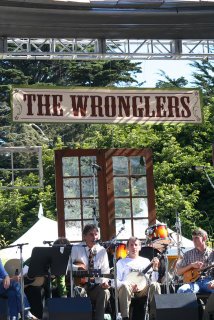
I spent most of the weekend at the Hardly Strictly Bluegrass festival in Golden Gate Park. I was hardly the only one who went; police estimate that as many as 500,000 came to Speedway and Marx Meadows to hear one of the 67 bands.
Like many San Franciscans, I love this festival, but not only because of the music. I love it because it is the gift of an idiosyncratic music lover, one who gets such sheer pleasure from banjo picking that he wants to make sure other people get a chance to hear the twang.
Some billionaires give money for buildings. Some build lavish homes or buy island retreats. Some give money to fight AIDS, or illiteracy, or homelessness. Warren Hellman probably spends money on all the issues listed above, but he is best-known for spending millions of dollars each year to put on the Hardly Strictly Bluegrass Festival. He’s done it for six years and plans to continue the festival long after his death.
Warren is my cousin. To be exact, he’s my first cousin once removed. He and my father were first cousins. And he and I share a common ancestor: Isaias Hellman, the man I am writing a book about.
One question that intrigues me about Isaias Hellman, who came to California from Los Angeles in 1859 and went on to play a critical role in the development of the state, is why was he so successful when others were not. Part of it was timing; he arrived in Los Angeles when it was a small pueblo and was able to get in on the ground floor of many major industries, including banking, transportation and land development.
Part of me thinks, however, that Isaias Hellman had a particular business genius, a brain that let him see the bigger picture. He rarely made a misstep business-wise, always investing his funds in industries that grew and grew. You go through his papers and see him progressing. He first owned a dry goods store, then a bank, then a water company and later a gas company, then a trolley company, then a vineyard, then lots of land, then more trolleys, then more banks and a sizeable amount of a hydroelectric company. The only industry he missed was the motion-picture business. But he died in 1920, and if he had lived longer he might have invested there as well.
Now, is that kind of genius genetic? Clearly, smart people have smart children, but can a particular attribute like business savvy be passed on.
The best argument I can find that demonstrates genius can be passed on is by looking at Warren Hellman. While he was born into an affluent family, he has made his billion on his own. He is the head of Hellman and Friedman, an investment firm that took Levi’s private, owns much of the German media, a chunk of NASDQ and many other companies. There was just an article in the paper the other day that said Hellman and Friedman had made CALPERS, the huge state employee retirement fund, more than 130 percent return on an investment, the most of any other company in the country.
Warren admires his great grandfather Isaias Hellman. He often talks about him in speeches, and holds him up as an example of a man that made money, but who was sure to donate back to his community. Warren measures himself against his ancestor. And even though Warren has made more money than Isaias Hellman, I think Warren thinks Isaias was the better businessman. After all, Isaias had to work for everything and was handed nothing.
When I am at the bluegrass festival, singing and swaying to musicians like Elvis Costello and T-Bone Burnett, I always keep an eye out for Warren. He tries to catch most of the acts of the festival by riding around on a cart between the five stages. He’ll hear 10 minutes here, another 15 minutes there. He looks so happy. He would rather hang out with Emmy Lou Harris than Arnold Schwarzenegger any day. And he would rather share his love for bluegrass music with hundreds of thousands of music fans than keep that money in a bank.
(The photos are of Warren playing banjo with his band, the Wronglers, at the festival. )


2 comments:
Your cousin's festival is amazing. To have the stellar line-up in a beautiful setting for free is a true gift to the region.
I'm glad you're blogging again!
Post a Comment